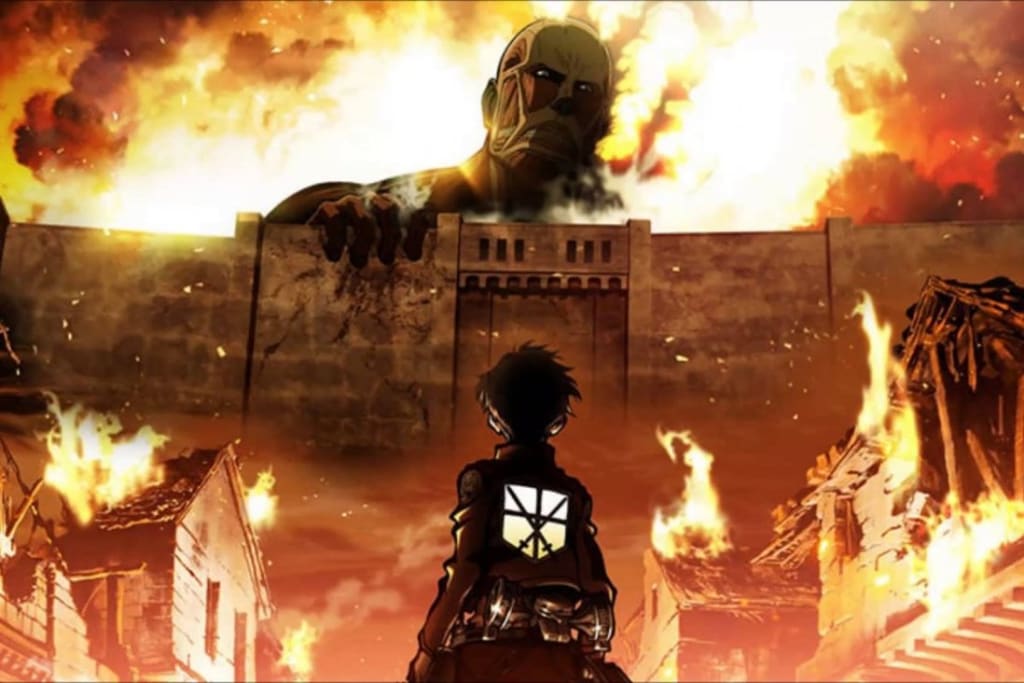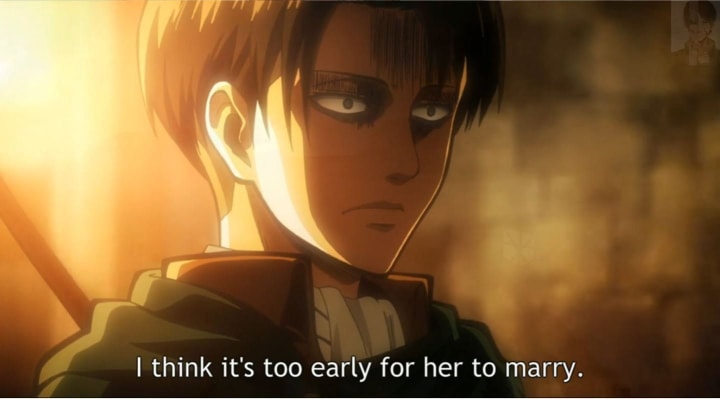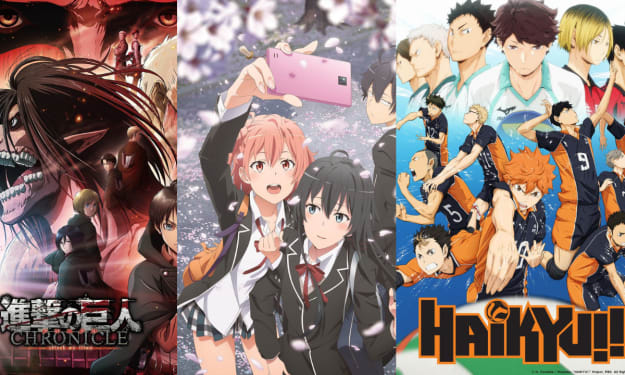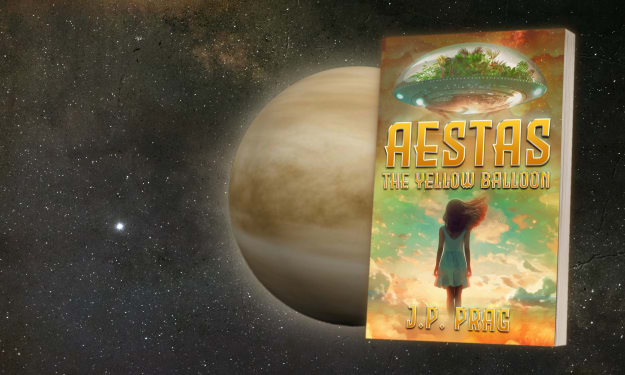I Spent More Than 24 Hours In The Last 3 Days Watching Attack On Titan
My recent addiction to this amazing anime.

I was watching a pro gamer streaming on Twitch a few days ago. A donator asked him a question about the animes he was watching. More specifically, the donor asked him if he was excited for the new episode of Attack On Titan that was coming out the next day.
The gamer talked about how he was very excited. But it wasn't just him. He spoke about how every Sunday (when a new episode of Attack On Titan airs) was the most anticipated day for him and his girlfriend. His girlfriend absolutely adores the show.
Hearing this, I decided to give Attack On Titan a try.
It's not my first time watching this show, however. I began watching it about two years after the show first came out. At the time, I was in middle school.
The show didn't resonate with me much. I finished the first season and stopped. I didn't pay attention to any of the news regarding future seasons and, for the most part, forgot about the anime.
I did end up coming back to the Attack On Titan in high school, though in a different format. I lacked time to sit down and watch 20-minute episodes, so I read manga instead.
I'm one of those people who dislike rereading books or rewatching shows. Having already learned the entire plot of Attack On Titan, I wasn't in a mood to watch the anime.
That was the case until the gamer talked about the show. I was bored, so I decided I'll watch it.
After A 3-Day Binging Spree
Well, I did nothing in the last three days except watch Attack On Titan. With each episode being a little more than 20-minutes long and currently 67 episodes in the show, I ended up spending 24 hours in the last 3 days watching this show.
My binging spree was pretty insane. I started watching on the first day in the evening and stayed up all the way until three in the morning. Then I woke up at eight-sleeping only five hours-and continued watching the anime for the entire day. The only times I stopped watching the anime was when I had to eat or take a bathroom break. I ended up sleeping at 3:00 AM and waking up at 8:00 AM. I continued watching anime right from where I left off to eventually finishing the current number of episodes.
Here I am writing about Attack On Titan now. What shocked me was that I didn't get tired from watching Attack On Titan. The last time I slept at 3:00 AM was when I was doing an architecture project for school last minute. When I woke up the next day, I was exhausted and needed to nap. Somehow I was awake for 19 hours straight. The show was just that exciting.
What It's Really Like
Attack On Titan explores complex ideas and topics that I never understood when I was in middle school. After aging a little bit and improving my ability to see from different people's perspectives, Attack On Titan blew my mind when relating those ideas with the real world.
In the first two seasons, the show focuses a lot on what war is really like. Attack On Titan starts as a show about humanity trying to survive against titans who eat humans. Humanity ends up living within huge walls to protect itself. One day, two specialized titans break the first wall, allowing hordes of titans to invade. The story revolves mostly around a group of soldiers known as the Survey Corps and their fight against the titans.
The show is quite gruesome, especially in the first two seasons, for a reason. The show contains many scenes where not only soldiers but innocent civilians are being ripped apart and eaten alive. That was part of the reason why I didn't particularly enjoy Attack On Titan during middle school. These scenes were all vividly animated, showing each characters' tears and screams as well as their blood splattering everywhere as titans rip their bodies apart.
But it wasn't that my younger self couldn't handle bloody scenes. It was the emotions behind each death. Attack On Titan did a fantastic job at quickly building a backstory to these characters to allow the viewer to bond with the character and then suddenly killing them off. I will criticize the show a little bit, however, as I think they overdid these character-building strategies to the point that you can tell who exactly is going to die.
But for the most part, many of these character's deaths were emotionally grinding. The most painful scene for me was when the soldiers returned to the city after a defeat against a special titan. One of the captains lost his entire squad. When the captain returned, the dad of one of the soldiers in his team came to him all excited and talked to him all about his daughter. He spoke about his daughter's dreams, aspirations, and how he was super excited to see her. The only thing the captain did was stare forward.

It instantly made me think about what happens in reality. Bearing the responsibility of telling someone about their loved ones' deaths is one of the worst jobs to have. We have to remember that it's easy to distance ourselves and say we lost millions of people in wars when those people are complete strangers. We have to remember that we're not just losing people, but we're losing people, each with their own lives, dreams, and aspirations.
Sometimes, we justify the deaths of our soldiers by calling them heroes. They died giving their lives to our country and peace. While we should remember the people that sacrificed their lives and honor them, it takes away from the real brutality of wars. Attack On Titan makes a statement that heroes are few and far between.
There are very few heroic deaths in the show. Most people die without contributing much or saving anyone. And even if the soldiers confidently talk about sacrificing themselves for the greater good, they end up dying in tears wishing life was different for them.
Overall, Attack On Titan shows what it's really like to fight a war even though the anime takes place in a fantasy world. It's filled with action, gore, and heart-ripping scenes.
Philosophical And Psychological Explorations
In the third and fourth seasons, Attack On Titan explores much more controversial topics worth thinking about.
One of the topics I was most fascinated with was the idea that we're all two sides of the same coin in war. We have our differences, but we're all the same at our core. In a war such as World War II, were we really the good guys?
Most of our movies about war are written to present the Axis powers as the bad guys. We generally focus on our own feelings and stories and set up the Axis powers as evil villains we have to beat. But in reality, it's the exact same on the other side. There are good and bad people on both sides. We're all the same.
Attack On Titan does a wonderful job of exploring this idea. When the attacked attacks the attackers, the show shows the same things of innocent people being murdered. They set up the attackers later on in the story as people who were just trying to live, and now they were dying.
And in the same fashion, the story writers set up particular survivors as characters driven by revenge, creating a cycle of hatred. One of the commanders in the show had a brilliant quote.
"Humanity doesn't stop fighting until there is one human or less."
If I kill your family member, you might seek revenge and kill me. Then one of my family members may seek revenge and kill you. Then another one of your family members will seek revenge and so on until only one person or fewer lives. When and how do we stop these cycles of hatred?
Apart from philosophical explorations, Attack On Titan also gives a taste of PTSD and what goes through soldiers' minds. Just by looking at each soldier's face in various scenes gives you a rough idea of what they're feeling and thinking about after watching all of their friends die brutally.
It gets even more emotional when the soldiers aren't just fighting titans, but humans as well. When it gets to that part, you can clearly tell that the soldiers aren't just suffering from watching others die and living in fear of their own lives. They begin thinking, "Am I actually a murderer?"
Attack On Titan isn't just that show you watch because it has incredible action scenes, but the show you watch for its tackle on real-world problems.
Knowing A Little About Film-Making Goes A Long Way In Appreciating Shows
I mentioned before that I read the entirety of the manga. I'm the type of person who dislikes watching something if I already know the plot. But that might be changing with Attack On Titan.
By already knowing what happens, there's a lot of advanced nuances I can focus on—things like each person's expressions, their actions, and what they say. I can focus on things like foreshadowing and learn what makes Attack On Titan so good.
In particular, I enjoyed Attack On Titan's ability to draw facial expressions that tell us everything. Nobody needs to say anything. You just know.
Having a little bit of film knowledge from my English classes in school and studying a little bit of video editing on the side helped me appreciate this show much more. You not only enjoy the show, but you understand pieces of what makes it good.
Attack On Titan isn't perfect, but it's pretty damn amazing.
About the Creator
Kevin Shan
Project Manager for Concierge Auctions selling multi-million dollar real estate at auction globally blogging on the side for fun.






Comments
There are no comments for this story
Be the first to respond and start the conversation.